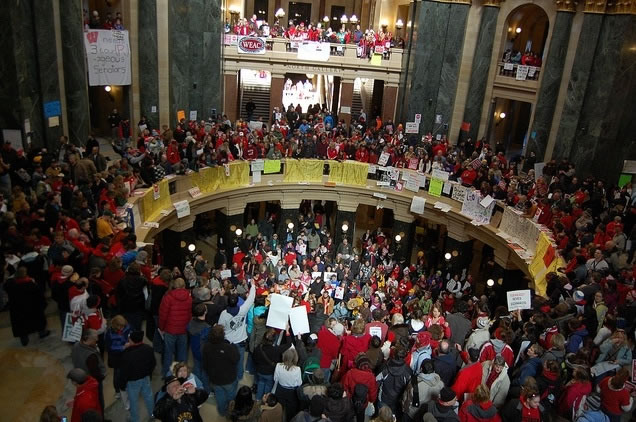Public Sector Unions Give Some Citizens an Unfair Advantage in the Public Policy Process

Modern law, coupled with modern communication and an abundance of lawyers, have rendered labor unions obsolete. We are no longer in danger of having seven-year-olds work 12-hour shifts in unsafe sweatshops for pennies a day. That said, I have no objection to private sector unions as long as membership and employer participation are entirely voluntary. However, public sector unions, or government employee unions, should never have been allowed to exist in the first place.
There is a world of difference between the governing and private sectors of our society, and hence a world of difference between the effects of government and private sector unions, and it is that difference that makes government unions not only impractical, but incompatible with governments deliberately designed to protect the legitimate rights and legal equality of all citizens.
While Franklin D. Roosevelt believed that some organization of government employees was "logical" since they shared the same desires for adequate pay, reasonable working conditions, (etc.) as other workers, even FDR saw the distinction between public and private sector workforces as making public sector unions a bad idea. In 1937 he wrote:
"All government employees should realize that the process of collective bargaining, as usually understood, cannot be transplanted into the public service. It has distinct and insurmountable limitations when applied to public personnel management. The very nature and purposes of Government make it impossible for administrative officials to represent fully or to bind the employer.... The employer is the whole people, who speak by means of laws enacted by their representatives...." [Emphasis added.]
Roosevelt also disapproved of public employees going on strike, noting that, "Particularly, I want to emphasize my conviction that militant tactics have no place in the functions of any organization of Government employees." (I wonder what FDR would have thought about last year's protests by Wisconsin's public employees?)
As FDR saw, the main problem with government unions is that citizens working for government are still citizens, with the same voting rights as every other citizen--in other words, by their right to vote, government employees are in effect both management and labor. When private sector unions negotiate, the companies they are negotiating with are making decisions that affect only their own money. However, when government unions negotiate, the "management" they are negotiating with is "we, the people", or more precisely, with elected officials who, as a result of both public and private sector citizens' votes, not only represent both labor and "management," but are making decisions that affect other people's (taxpayers) money.
If even FDR could see and warn against the disruptive nature of public sector unions on our governments, not to mention the ultimately corrupting influences on our political processes, how can any government union even pretend to claim legitimacy, let alone rationalize their now outrageous claims on the public purse? The average government employee is far better compensated than the average private sector employee, and far, far better compensated when benefits like health insurance, retirement, paid vacations, sick days, personal days, numerous paid holidays, and job security are taken into consideration.
Just who do government employees think is the "management" that is getting rich by "exploiting" their labor? As already noted, by myself and even FDR, management is "we, the people," specifically taxpayers, who have every right to determine not only how much we want to pay for any given service, but whether or not we want a particular service at all.
Allowing bureaucrats and other government employees to unionize distorts their relationship to the body politic, undermining the freedom, property rights, and voting rights of other citizens. It also diminishes their understanding and appreciation of wealth creation, which is, of course, the exclusive province of private sector markets. No matter how important their job might be, government employees need to remember that their jobs cannot exist without the surplus wealth, or profits, created in the private sector.
The idea that one group of citizens (government employees) have a right to use their vote to dictate their wages and terms of employment to their fellow citizens --through elected officials who have an obligation to represent all citizens-- simply means that "some citizens are more equal than others."




